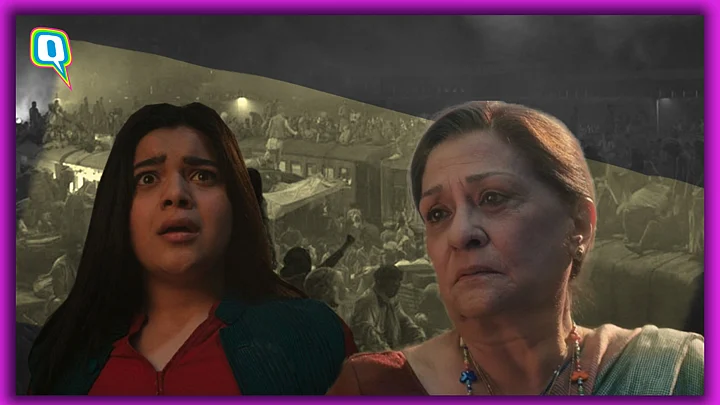There’s a slim chance that a South Asian saw Ms Marvel and didn’t notice the heavy influence of their culture in the show. Based in New Jersey, the show covers the story of Kamala Khan, aka Ms Marvel, the daughter of Pakistani immigrants who discovers her superpowers through a bracelet she inherited from her great-grandmother.
Kamala is a hardcore Marvel fan and often finds herself in crosshairs with her parents who are trying to uphold their traditional values and culture.
One thing Ms Marvel does differently, and rather thoughtfully, is craft a backstory for Kamala’s powers based on the India-Pakistan Partition of 1947.
The partition was easily one of the most crucial events in India and Pakistan’s history and has completely changed the course of both countries’ futures as we know them today.
Having such a crucial element of South Asian history being represented so heavily in a western produced show is nothing short of a marvel (pun intended).
Kamala’s grandmother, Sana, first discovered these powers during the partition when she was just a mere child. In order to ensure their survival, Sana's father scrambled to catch the last train from India to Pakistan, like millions of Indians back in 1947.
Communal unrest was heightened as most families were displaced, resulting in horrible acts of sexual violence, arson, abductions, and unfathomable crimes against children on both sides of the border. In the midst of this, Aisha’s powers were born.
The Partition Isn’t Just a Hook
Ms Marvel doesn’t just use the partition as a hook to further its plot. It repeatedly goes back to that part in history and brilliantly weaves it with Kamala’s own journey as she discovers her powers and familiarises herself with them.
A scene from the earlier episodes also shows how Kamala’s family recounts the horrors of the partition during a dinner table conversation. Her father speaks about the trauma millions of Indians went through while her mother finds it difficult to even speak about the subject.
The Marvel of Inclusivity In Writing
It is no surprise that Ms Marvel is turning out the way it is. Pakistani and Indian songs blend seamlessly into the background of the show. It also shows a young girl, Nakia, who is also Kamala’s best friend running for a position at the mosque board– and winning it, giving the traditional Islamic stereotypes a change.
Apart from this, showing the celebration of festivals like Eid, and having uncommon Bollywood songs play during a wedding scene (the only other show that does this is The Office) are just some of the many thoughtful things the writers have incorporated into the show. But exactly how does Ms Marvel do all of this so spectacularly? Because they have a diverse writing team.
The show is created by Bisha K Ali, who is a British-Pakistani stand-up comedian and screenwriter. Ali is also the head writer of the show. One of the two staff writers is Aisha Bhoori, a queer Pakistani-American writer. The combined experiences of these writers, which come from being a Pakistani and also living in a western country result in a beautiful amalgamation of a well-thought and culturally diverse show. They have first-hand experience with the culture they are writing about, which makes the show’s cultural influences more convincing.
Marvel Is Keeping Its Promise
This move towards inclusion and diversity didn’t just happen by chance. It is a very intentional step that Marvel has taken, as they promised in 2019 as they embarked on the fourth phase of the MCU.
Victoria Alonso, the executive vice president of production at Marvel, along with president Kevin Feige, promised in 2019 that Marvel would have a more diverse set of characters in an interview with Vulture.
Casting director Sarah Halley Finn added to this and also said, “You’re gonna see even more new faces—and faces from all different backgrounds, all ages, all ethnicities, LGBTQ, people who are differently-abled. It’s a priority to have authenticity, to increase representation, to give greater representation to actors who have not traditionally been represented in mainstream movies on the big screen.”
And they have lived up to the promise. Since Marvel’s phase four, a score of LGBTQIA+ characters made it to the lead cast. In Eternals, Phastos, played by Brian Tyree Henry, is a queer character of colour who is shown with his family: his husband and their son.
Loki, played by Tom Hiddleston, became MCU’s first bisexual lead character when he spoke to an alternate-reality female version of himself and said that he preferred “a bit of both,” when asked about his sexuality.
Kevin Feige and Tessa Thompon both confirmed during ComicCon that the latter’s character, Valkyrie, from Thor, is queer. This is even more significant since Thompson herself is openly bisexual.
Along with sexuality, Marvel has become more inclusive even in terms of race and ethnicity. Shang-Chi, played by Simu Liu, became Marvel’s first Asian superhero when the film Shang-Chi and The Legend of The Ten Rings released in 2019.
Black Panther was the first movie, that even though was based in a fictional country, tried to explore African culture. Chadwick Boseman also became the first person of colour to play a Marvel superhero not just in the MCU, but in the history of superheroes in general.
Brie Larson became the first female superhero in the MCU to have her own feature film Captain Marvel in 2019.
Not just in the cast, Marvel has been expanding its inclusivity and diversity initiative even in terms of directors and crew members. Right from having Pakistani writers in the team of Ms Marvel to having Chloé Zhao, the first Asian woman to win an Oscar direct Eternals, it is clear that this move to become inclusive is multi-faceted.
